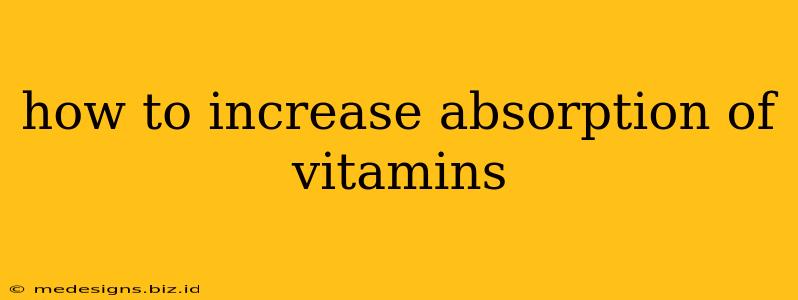Vitamins are essential micronutrients that play a crucial role in maintaining good health. However, simply consuming foods rich in vitamins doesn't guarantee optimal absorption. Several factors influence how well your body utilizes these vital nutrients. This comprehensive guide explores effective strategies to boost vitamin absorption and maximize the benefits for your well-being.
Understanding Vitamin Absorption: The Basics
Before diving into strategies, let's briefly touch upon the process. Vitamin absorption occurs primarily in the small intestine. Different vitamins have unique absorption mechanisms, influenced by factors like their chemical structure and the presence of other nutrients. Fat-soluble vitamins (A, D, E, and K) require fat for absorption, while water-soluble vitamins (B vitamins and C) are absorbed differently.
Factors Affecting Vitamin Absorption
Several factors can hinder efficient vitamin absorption:
- Poor Diet: Diets lacking in fiber, healthy fats, or specific minerals can impair absorption.
- Digestive Issues: Conditions like Crohn's disease, celiac disease, and irritable bowel syndrome (IBS) can negatively impact nutrient uptake.
- Medications: Certain medications can interfere with vitamin absorption.
- Age: Absorption efficiency can decline with age.
- Genetics: Genetic factors can influence how your body processes vitamins.
- Alcohol Consumption: Excessive alcohol can damage the gut lining, reducing vitamin absorption.
Proven Strategies to Boost Vitamin Absorption
Now let's explore practical steps to improve your body's ability to absorb vitamins:
1. Eat a Balanced Diet
This is the cornerstone of good vitamin absorption. A balanced diet rich in fruits, vegetables, whole grains, lean proteins, and healthy fats provides a wide range of vitamins and the necessary co-factors for their absorption. Focus on a variety of colorful fruits and vegetables to ensure a comprehensive intake of different vitamins.
2. Pair Fat-Soluble Vitamins with Healthy Fats
For optimal absorption of vitamins A, D, E, and K, consume them with healthy fats. Add avocado, nuts, seeds, olive oil, or fatty fish to your meals containing these vitamins. For example, a salad with leafy greens (vitamin K) and a vinaigrette dressing (healthy fats) is a great combination.
3. Improve Gut Health
A healthy gut microbiome is essential for efficient nutrient absorption. Consume probiotic-rich foods like yogurt, kefir, sauerkraut, and kimchi. Prebiotics, found in foods like bananas, onions, and garlic, also feed beneficial gut bacteria. Consider incorporating foods high in fiber to promote a thriving gut environment.
4. Manage Digestive Issues
If you suffer from digestive problems, address them proactively. Work with a healthcare professional to manage conditions like IBS, Crohn's disease, or celiac disease. Proper diagnosis and treatment are crucial for improving vitamin absorption.
5. Minimize Alcohol Consumption
Excessive alcohol consumption can damage the gut lining, reducing nutrient absorption. Moderate alcohol intake or abstinence is recommended for optimal vitamin absorption.
6. Consider Vitamin Supplements Wisely
While supplements can be helpful in certain cases, it's crucial to consult a healthcare professional before taking any vitamin supplements. They can help determine if you need supplements and the appropriate dosages to avoid potential risks of overdose. Furthermore, absorption of supplements can vary; some are better absorbed than others.
7. Pay Attention to Food Preparation Methods
Certain cooking methods can reduce vitamin content. Steaming or lightly cooking vegetables retains more nutrients than boiling or frying.
Conclusion: A Holistic Approach to Vitamin Absorption
Increasing vitamin absorption is a holistic endeavor. It's not just about consuming vitamin-rich foods; it's about nurturing your overall health. By adopting a balanced diet, supporting gut health, addressing any digestive issues, and making informed choices about supplements, you can significantly enhance your body's ability to absorb and utilize these essential nutrients for optimal health and well-being. Remember to consult with your doctor or a registered dietitian for personalized advice on improving your vitamin intake and absorption.
